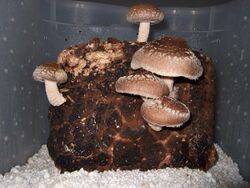Biology:Active hexose correlated compound
Active Hexose Correlated Compound (AHCC) is an alpha-glucan rich nutritional supplement produced from the mycelia of shiitake (Lentinula edodes) of the basidiomycete family of mushrooms. The compound is a subject of research as a potential anti-cancer agent but has not been conclusively found to treat cancer or any other disease, and there are conflict of interest concerns about the published research.[1][2] AHCC is a popular alternative medicine in Japan.[3]
Chemical composition
Polysaccharides comprise 40% of the composition of AHCC[citation needed]. These include beta-glucan (β-glucan) and acetylated α-glucan. Acetylated α-glucan, produced by culturing the mushroom mycelia, is unique to AHCC[citation needed]. Glucans are polysaccharides and these polysaccharides are known to have immune stimulating effects.[4]
As a supplemental alternative medicine
AHCC is widely used in Japan and China. It is available to the general public in Japan and China without a prescription and many people use it for general health maintenance and treatment of acute infections. Its legal status is that of a "functional food".
In Japan, AHCC is the 2nd most popular complementary and alternative medicine used by cancer patients. Agaricus blazei supplements are the most popular, outpacing AHCC use by a factor of 7:1.[3]
Research
Nearly all of the research into AHCC has been funded by the manufacturer, which complicates the discussion of currently available results – independent research is needed to verify them.[2] The mechanism of action of AHCC is poorly understood and there is little known about its safety.[2] (As of 2011) clinical research into AHCC has been of poor quality: there are no large-scale studies or randomized controlled trials.[2]
Laboratory research suggests AHCC may have immunostimulatory effects.[2]
AHCC has been proposed as a treatment for cancer, but research into its effectiveness has produced only uncertain and inconclusive evidence.[1] Detailed research is needed into the pharmacology of AHCC before any recommendation of its use as an adjuvant therapy can be made.[2]
See also
- Alternative cancer treatments
- Agaricus blazei mushroom
- Medicinal mushrooms
- Shiitake
References
- ↑ 1.0 1.1 "AHCC". WebMD. http://www.webmd.com/vitamins-supplements/ingredientmono-1110-ahcc.aspx?activeingredientid=1110&activeingredientname=ahcc. Retrieved 23 September 2018.
- ↑ 2.0 2.1 2.2 2.3 2.4 2.5 "An evidence-based review of a Lentinula edodes mushroom extract as complementary therapy in the surgical oncology patient". JPEN J Parenter Enteral Nutr 35 (4): 449–58. 2011. doi:10.1177/0148607110380684. PMID 21628606. "It is important to note that the vast majority of the published research on AHCC has been supported by the manufacturer.".
- ↑ 3.0 3.1 "Nationwide survey on complementary and alternative medicine in cancer patients in Japan". Journal of Clinical Oncology 23 (12): 2645–54. April 2005. doi:10.1200/JCO.2005.04.126. PMID 15728227.
- ↑ Fujii H, Nakagawa T: Novel substance having physiological activity, process for producing the same, and use, U.S. Patent Application Publication, Mar 6, 2003.


